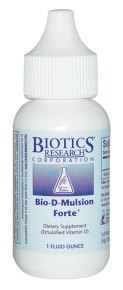
Product Information
Bio D Mulsion Forte
Quantity: 30Manufacturer: Biotics Research Corporation Price: Please call for details
Description of product
Evidence clearly suggests vitamin D deficiency/insufficiency is widespread in the
developed world. Additionally, we now know the previously defined Upper Limit for safe intake of vitamin D was set far too low, and the physiologic requirement is
significantly higher than previously believed.
With the discovery of vitamin D receptors in tissues other than the gut and bone - particularly the brain, breast, prostate and lymphocytes - recent research suggests the utilization of higher amounts of supplemental vitamin D3 for a wider range of
applications in order to maintain and improve patients’ health.
Bio-D-Mulsion® & Bio-D-Mulsion Forte® from Biotics
Research Corporation both supply vitamin D3 as a
micro-emulsion for enhanced absorption and utilization, which is particularly important for those with malabsorption conditions. Clinical use of Biotics’ micro-emulsified vitamin D provides significant improvements in serum levels of
25-OH-vitamin D following supplementation.
Bio-D-Mulsion® supplies 400 IU of vitamin D3 per drop, while Bio-D-Mulsion Forte® supplies 2,000 IU of vitamin D3 per drop.
While we are all familiar with the importance of vitamin D in calcium absorption and bone metabolism, many may not be aware of the recent research on vitamin D and the widening range of applications available for cholecalciferol, which can be classified as both a vitamin and a pro-hormone.1 Additionally, while it has commonly been assumed the upper limit of safe intake is approximately 1,000 IU per day, we now know that the physiologic requirement of vitamin D may be as high as 4,000 IU per day, which is less than half of the 10,000 IU that can be produced endogenously with just a few minutes of sun exposure.2
Vitamin D Deficiency and Musculoskeletal Health
Vitamin D deficiency is associated with dull, achy musculoskeletal pain that is incompletely responsive to both pharmacologic and manual therapies. The pain may be widespread or confined to a particular area, most commonly the lower back and lumbar spine. The process by which this occurs has been clearly defined: 1) vitamin D deficiency causes a reduction in calcium absorption, 2) production of parathyroid (PTH) hormone is increased to maintain blood calcium levels, 3) PTH results in increased urinary excretion of phosphorus, which leads to hypophosphatemia, 4) insufficient calcium phosphate results in deposition of unmineralized collagen matrix on the endosteal (inside) and periosteal (outside) surface of bones, 5) when the collagen matrix hydrates and swells, it causes pressure on the sensory-innervated periosteum resulting in pain.3 Indeed, several clinical investigations have recently shown vitamin D deficiency is particularly common among people with musculoskeletal pain.4, 5
Non-Musculoskeletal Manifestations of Hypovitaminosis D
Both the peripheral and central nervous systems have multiple sites of action for vitamin D, and it appears likely that vitamin D modulates serotonin and melatonin synthesis and metabolism. Alterations in vitamin D levels appear to explain, at least in part, the adverse psychological effects of sunlight deprivation that often occur due to geographic location and climate.6 Preliminary evidence suggests vitamin D deficiency may also be particularly common among patients with inflammatory and autoimmune disorders, and that vitamin D may modulate inflammatory responses.7, 8, 9
Bio-D-Mulsion® and the Importance of Micro-Emulsification
Biotics Research Corporation’s vitamin D is micro-emulsified to enhance absorption and utilization, which are particularly important for those with malabsorption conditions. Independent clinical experience suggests the micro-emulsion form of
vitamin D provides significant improvements in serum levels of 25-OH-vitamin D following supplementation.10 Each drop of Bio-D-Mulsion® supplies 400 IU of vitamin D3, while each drop of Bio-D-Mulsion Forte® supplies 2,000 IU of vitamin D3. With an increased knowledge of the importance of maintaining adequate vitamin D levels, many clinicians recommend supplementation and annual screening for 25-OH-vitamin D levels, especially for patients at risk for deficiency as well as those who may benefit from supplementation.11
1. Norman AW. Vitamin D. In: Brown ML (Editor). Present Knowledge in Nutrition. Sixth Edition.
Washington: International Life Sciences Institute Nutrition Foundation; 1990. P.108-116
2. Vieth R. Vitamin D supplementation, 25-hydroxyvitamin D concentrations, and safety. Am J Clin Nutr.
1999 May; 69(5):842-56 Available on-line at http://www.ajcn.org/cgi/reprint/69/5/842.pdf
3. Holick M F. Vitamin D deficiency: what a pain it is. Mayo Clin Proc. 2003 Dec;78(12):1457-9
4. Al Faraj S, Al Mutairi K. Vitamin D deficiency and chronic low back pain in Saudi Arabia. Spine. 2003
Jan 15;28(2):177-9
5. Plotnikoff GA, Quigley JM. Prevalence of severe hypovitaminosis D in patients with persistent,
nonspecific musculoskeletal pain. Mayo Clin Proc. 2003 Dec;78(12):1463-70
6. Lansdowne AT, Provost SC. Vitamin D3 enhances mood in healthy subjects during winter.
Psychopharmacology (Berl). 1998 Feb;135(4):319-23
7. Yamashita H, Noguchi S, Takatsu K, Koike E, Murakami T, Watanabe S, Uchino S, Yamashita H, Kawamoto
H. High prevalence of vitamin D deficiency in Japanese female patient with Graves’ disease. Endocr J.
2001 Feb;48(1):63-9
8. Huisman AM, White KP, Algra A, Harth M, Vieth R, Jacobs JW, Bijlsma JW, Bell DA. Vitamin D levels in women
with systemic lupus erythematosus and fibromyalgia. J Rheumatol 2001 Nov;28(11):2535-9
9. Van den Berghe G, Van Roosbroeck D, Vanhove P, Wouters PJ, De Pourcq L, Bouillon R. Bone turnover in
prolonged critical illness: effect of vitamin D. J Clin Endocrinol Metab. 2003 Oct;88(10):4623-32
10. Mercola J. Bio-D-Mulsion (Emulsified Vitamin D): “The Vital Supplement that I Strongly Recommend to
Nearly All of My Patients” http://www.mercola.com/forms/vitamind.htm on March 25, 2004
11. Vasquez A, Manso G, Cannell J. The Clinical Importance of Vitamin D (Cholecalciferol): A Paradigm Shift
with Implications for All Healthcare Providers. Alternative Therapies in Health and Medicine and Integrative
Medicine: A Clinician’s Journal In press 2004

